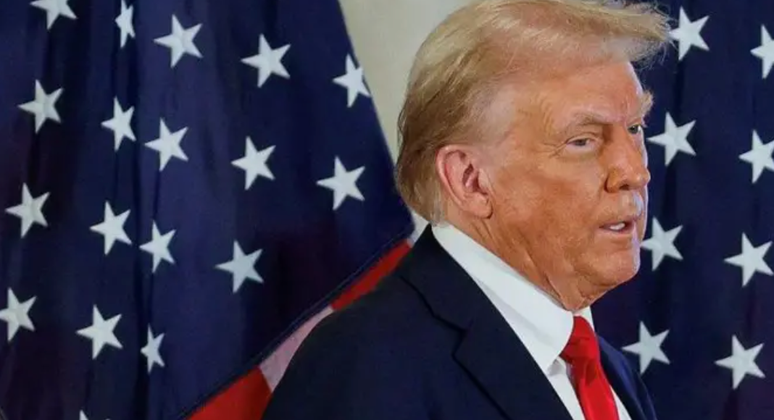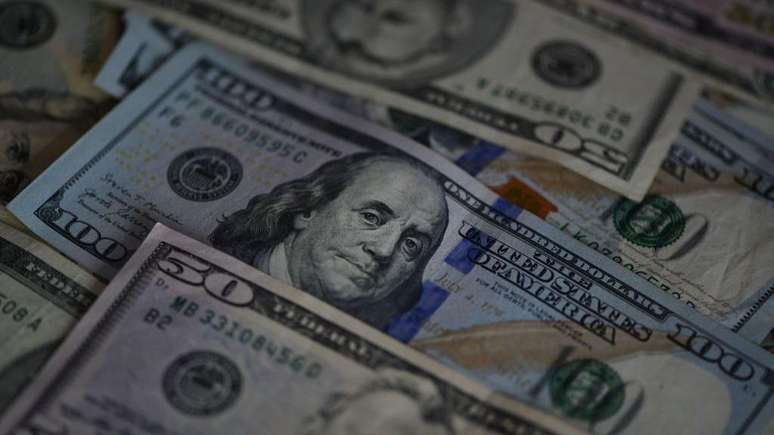For analysts, the increase reflects expectations about the economic policies of the future Trump administration, which could be more protectionist, leading to a rise in inflation and interest rates in the US.
With the news of Donald Trump’s election as president of the United States, the dollar skyrocketed. The expectation is that the victory will impact the global economy.
The dollar appreciated about 1.4% against a range of currencies including the pound, euro and Japanese yen.
The DXY index, which measures the performance of the dollar against a basket of foreign currencies, recorded a rise of 1.7% this Wednesday morning (6/11).
In Brazil, the currency rose from R$5.74 to R$5.86 around 9 a.m., the highest since 2020, amid the pandemic.
Interest in the topic on the internet has skyrocketed in the last few hours, according to Google Trends data, and it is the second most searched topic of the day, second only to the American elections. The value fluctuated throughout the day.

The agenda that the future president promises to implement, which includes the deportation of undocumented immigrants, import tariffs and increased subsidies, could increase American public debt, fuel inflation and reduce global trade, according to analysts interviewed by BBC News Brasil.
The impact is expected to be negative, in the short term, for the Brazilian economy, with a higher dollar cycle.
This Wednesday (11/6), the Monetary Policy Committee (Copom) of the Central Bank decides how much the base interest rate, the Selic, will increase in a context of a rising dollar. The market expects the rate to be increased by 0.5 percentage points.
For Hugo Garbe, professor of economic sciences at Mackenzie Presbyterian University, the dollar should recover in the short term, due to speculation about how Trump will act in the economy.
But the economist estimates that the recent devaluation of the real is also influenced by internal factors.
“A large part of the dollar is affected by the fiscal policy of the Lula government, which has had a brutal deficit in recent months. Another important factor has also been the expectation of fiscal reform which has not yet been implemented.”
The professor reminds us that every uncertainty in economics generates some type of expectation.
“In the financial market they say that ‘the market is cowardly.’ This means that any new fact, be it elections, increases in interest rates, political factors, which has not yet been discounted, generates an effect on the financial market. financial market,” explains Garbe.
“The rise of the dollar means an outflow of dollars from Brazil to markets considered safer, such as the United States itself. When there is more outflow of dollars, there are fewer dollar reserves in Brazil and the price rises. This is the ‘effect of momentary uncertainty.’
Remember that one of the challenges for the government of the current US president, Joe Biden, in economic terms, has been rising inflation.
“Despite having significant job creation, the Biden administration has faced brutal inflation during its term. It has not been able to solve the inflation problem and Americans are very sensitive to inflationary processes Americans, for the last 40 years, have not known what inflation is.”
Economist Carla Beni, of Fundação Getulio Vargas, says that the currencies of emerging countries, such as Brazil, tend to suffer more from the impact caused by the increase in US treasury bonds.
“If Trump does exactly what he announced regarding the economy, which is to raise tariffs and make the country more protectionist, this will tend to increase inflation and then it will have to be controlled through interest rates,” explains Beni.
“This provides, for a ten-year bond, a higher rate. There is a repositioning in the world. Investors abandon their currencies and go to the dollar. In this scenario, emerging currencies are the ones that suffer the most. We live on the outskirts of this financial capitalism and suffers greatly from this impact.
For economist Vladimir Fernandes Maciel, coordinator of the Mackenzie Center for Economic Freedom, the increase reflects expectations regarding the economic policies of the future Trump administration, which could be more protectionist, especially towards China.
“It is worth saying that exporting to the US will be more difficult and the trend will be towards a reduction in the trade deficit in the US and the devaluation of other currencies,” explains Maciel.
“Consequentially, [teremos] a more appreciated dollar and more devalued other currencies.”
Source: Terra
Rose James is a Gossipify movie and series reviewer known for her in-depth analysis and unique perspective on the latest releases. With a background in film studies, she provides engaging and informative reviews, and keeps readers up to date with industry trends and emerging talents.




![Plus Belle La Vie Adher: What awaits you on Tuesday, July 15 in 376 Episodes, July 15, 2025 [SPOILERS] Plus Belle La Vie Adher: What awaits you on Tuesday, July 15 in 376 Episodes, July 15, 2025 [SPOILERS]](https://fr.web.img6.acsta.net/img/60/25/602558db87d6c8410a0a958afc82dcb8.jpg)

-1jyajqq3d5lya.jpg)
-1hrlykellx8ae.jpg)
